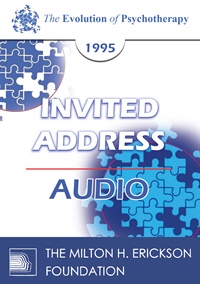
- Average Rating:
- Not yet rated
- Topic Areas:
- Invited Addresses | Object Relations Theory | Intimacy | Psychotherapy
- Categories:
- Evolution of Psychotherapy | Evolution of Psychotherapy 1995 | Pioneers in Couples and Family Therapy
- Faculty:
- James F. Masterson, MD | Cloe Madanes, HDL, LIC
- Duration:
- 1:29:20
- Format:
- Audio Only
- Original Program Date:
- Dec 17, 1995
- Short Description:
- The development and function of the self's capacity for intimacy is described through infancy, childhood and adolescence. The normal process of achieving intimacy is outlined. The illusions of intimacy of Disorders of the Self are then described with detailed clinical presentations of each diagnostic category. The therapeutic interventions necessary to deal with these defenses are then outlined.
- Price:
- $15.00 - Base Price
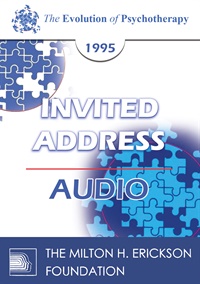
- Average Rating:
- Not yet rated
- Topic Areas:
- Invited Addresses | Aging and Mortality | Psychotherapy | Therapist Development
- Categories:
- Evolution of Psychotherapy | Evolution of Psychotherapy 1995
- Faculty:
- Mary Goulding, MSW | Joseph Wolpe, M.D.
- Duration:
- 1:18:52
- Format:
- Audio Only
- Original Program Date:
- Dec 17, 1995
- Short Description:
- As human beings age, we are bombarded with losses: of our professions, businesses or jobs; homes; health; ideals; friends; family members and partners. This address will offer special techniques, usable in brief or long-term therapy, to help aging clients find ways to honor their losses as well as their own integrity, as they continue to grow and to savor life.
- Price:
- $15.00 - Base Price
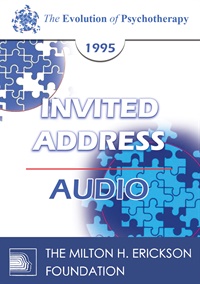
- Average Rating:
- Not yet rated
- Topic Areas:
- Invited Addresses | Psychoanalysis | Psychotherapy
- Categories:
- Evolution of Psychotherapy | Evolution of Psychotherapy 1995
- Faculty:
- Otto Kernberg, MD | Thomas Szasz, MD
- Duration:
- 1 Hour 25 Minutes
- Format:
- Audio Only
- Original Program Date:
- Dec 16, 1995
- Short Description:
- The major emphasis in contemporary psychoanalytic psychotherapy is on the early and consistent interpretation of the transference. A growing attention to countertransference analysis, to the risk of "indoctrinating" patients, to character analysis, to the analysis of unconscious meanings in the "here and now" also are dominant trends. Significant controversies continue regarding the importance of the "real" relationship, the therapeutic versus the resistant aspects of regression, the role of empathy, and the relation of historical to narrative truth.
- Price:
- $15.00 - Base Price
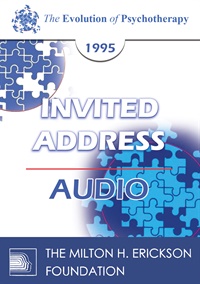
- Average Rating:
- Not yet rated
- Topic Areas:
- Invited Addresses | Psychotherapy | History of Psychotherapy | Therapist Development
- Categories:
- Evolution of Psychotherapy | Evolution of Psychotherapy 1995
- Faculty:
- James Bugental, PhD | Erving Polster, PhD
- Duration:
- 1 Hour 19 Minutes
- Format:
- Audio Only
- Original Program Date:
- Dec 16, 1995
- Short Description:
- For the past half-century there has been a remarkable and continual evolution in the theory and practice of psychotherapy. Now that evolution shows signs of becoming a revolution. Many elements of these changes are, as yet, only scantily represented in the literature, but they are the stuff of bull sessions, the more liberated case conferences and solitary, sometimes fearful, experimentations. This transition comes about from a variety of influences, among which three are particularly worthy of examination for what they suggest about what is likely to emerge a half-century from now.
- Price:
- $15.00 - Base Price

- Average Rating:
- Not yet rated
- Topic Areas:
- Invited Addresses | Psychotherapy | Therapist Development | Communication | Constructivism | Reframing | Ericksonian Hypnosis and Therapy Techniques
- Categories:
- Evolution of Psychotherapy | Evolution of Psychotherapy 1995 | Pioneers in Couples and Family Therapy
- Faculty:
- Paul Watzlawick, PhD | James F. Masterson, MD
- Duration:
- 1 Hour 28 Minutes
- Format:
- Audio Only
- Original Program Date:
- Dec 16, 1995
- Short Description:
- Watzlawick challenges the assumption that insight into the past is the key to change. He explores how insight can sometimes reinforce dysfunction rather than resolve it. Drawing from Ericksonian methods and constructivist theory, he presents alternatives such as reframing, behavior prescriptions, and planned chance events. The address offers a compelling look at how therapists can shift client realities by speaking their language and disrupting unhelpful patterns in the present.
- Price:
- $15.00 - Base Price
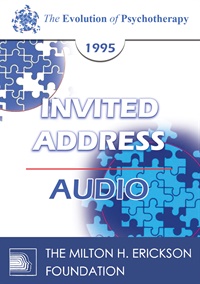
- Average Rating:
- Not yet rated
- Topic Areas:
- Invited Addresses | Family Therapy | Supervision | Therapist Development | History of Psychotherapy
- Categories:
- Evolution of Psychotherapy | Evolution of Psychotherapy 1995 | Pioneers in Couples and Family Therapy
- Faculty:
- Salvador Minuchin, MD | Jeffrey Zeig, PhD
- Duration:
- 1:07:40
- Format:
- Audio Only
- Original Program Date:
- Dec 16, 1995
- Short Description:
- Minuchin explores the parallels between supervision and therapy, both aiming to expand the repertoire of human behavior. Using a case with the Ramos family, he illustrates his dynamic, self-aware style of systemic intervention. He reflects on the shift from psychoanalysis to systemic thinking and outlines his supervision model, which fosters therapist flexibility, self-awareness, and responsiveness to family dynamics. Discussant Jeffrey K Zeig, PhD. Moderated by Janet Edgette, PsyD.
- Price:
- $15.00 - Base Price
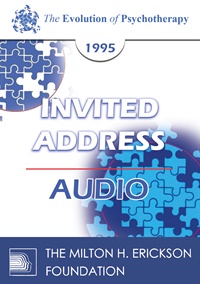
- Average Rating:
- Not yet rated
- Topic Areas:
- Invited Addresses | Existential Therapy | Therapeutic Relationship | Psychotherapy
- Categories:
- Evolution of Psychotherapy | Evolution of Psychotherapy 1995
- Faculty:
- Irvin Yalom, PhD | Miriam Polster
- Duration:
- 1:22:53
- Format:
- Audio Only
- Original Program Date:
- Dec 16, 1995
- Short Description:
- Existential psychotherapy is more properly viewed as a therapy informed by a sensibiity to existential issues, rather than as a discrete, self-contained school of therapy. It addresses the anxiety embedded in our consciousness of the parameters of existence, especially in our confrontation with death, meaninglessness, freedom, and isolation. I shall discuss these concerns, particularly those with the greatest relevance to everyday therapy practice. I shall discuss the implications of the existential sensibility for the conduct of therapy and the therapeutic relationship. Genuineness and authenticity are necessary.
- Price:
- $15.00 - Base Price
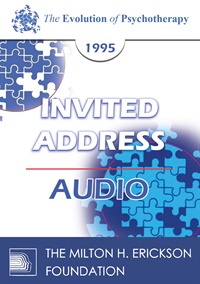
- Average Rating:
- Not yet rated
- Topic Areas:
- Invited Addresses | Focusing | Mind-Body | Psychotherapy
- Categories:
- Evolution of Psychotherapy | Evolution of Psychotherapy 1995
- Faculty:
- Eugene Gendlin, PhD | James Hillman, PhD
- Duration:
- 1 Hour 27 Minutes
- Format:
- Audio Only
- Original Program Date:
- Dec 16, 1995
- Short Description:
- Focusing is bodily attention, not to mere sensations but to an at first unclear, implicitly complex bodily sense-of a situation, problem, or aspect of life. Therapy deepens immediately with many clients if asked what physical sense comes in the middle of the body in relation to what is being worked on. With half a minute of repeated direct attention, clients can assign a "quality-word," e.g., "heavy," "fluttery," or "tight." Then small steps come to say the crux of the problem. Each brings a slight (later large) "shift" and release, a direct sense of validity, although further steps may again change the whole problem.
- Price:
- $15.00 - Base Price
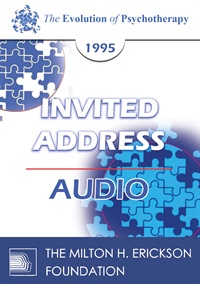
- Average Rating:
- Not yet rated
- Topic Areas:
- Invited Addresses | Ericksonian Hypnosis and Therapy Techniques | History of Psychotherapy | Psychotherapy | Therapist Development
- Categories:
- Evolution of Psychotherapy | Evolution of Psychotherapy 1995
- Faculty:
- Jeffrey Zeig, PhD | Otto Kernberg, MD
- Duration:
- 1 Hour 25 Minutes
- Format:
- Audio Only
- Original Program Date:
- Dec 14, 1995
- Short Description:
- Methods for training therapists customarily are directed to developing cognitive abilities. Using Milton Erickson as a model, an alternate, experiential approach is offered. The "evoking style" of the therapist determines the outcome of the treatment more than the theoretical and clinical methods to which the therapist ascribes.
- Price:
- $15.00 - Base Price
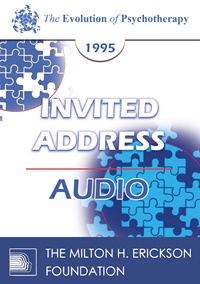
- Average Rating:
- Not yet rated
- Topic Areas:
- Invited Addresses | Ericksonian Hypnosis and Therapy Techniques | History of Psychotherapy | Hypnotherapy | Psychotherapy
- Categories:
- Evolution of Psychotherapy | Evolution of Psychotherapy 1995
- Faculty:
- Ernest Rossi, PhD | Eugene Gendlin, PhD
- Duration:
- 1 Hour 31 Minutes
- Format:
- Audio Only
- Original Program Date:
- Dec 14, 1995
- Short Description:
- The evolution of psychotherapeutic methods over the past 200 years from Mesmer through the psychoanalytic schools, behaviorism and current cognitive psychology tells a fascinating tale of our evolving understanding of human nature. In this address we will trace the development of fundamental techniques such as suggestion, free association, active imagination, gestalt dialogue, focusing, Erickson's indirect approaches and what I now call "The Basic Accessing Question."
- Price:
- $15.00 - Base Price
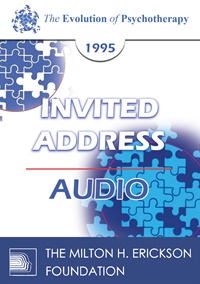
- Average Rating:
- Not yet rated
- Topic Areas:
- Invited Addresses | Psychotherapy | Solution Oriented Approach | Brief Therapy
- Categories:
- Evolution of Psychotherapy | Evolution of Psychotherapy 1995
- Faculty:
- Arnold Lazarus, Ph.D. | Donald Meichenbaum, PhD
- Duration:
- 1 Hour 23 Minutes
- Format:
- Audio Only
- Original Program Date:
- Dec 14, 1995
- Short Description:
- Anyone can perform brief or short-term therapy, but unless pivotal issues are addressed, the treatment will, at best, be too narrow and restricted. It is essential to employ empirically established methods whenever possible, but also to have a framework and rationale for on-the-spot inventiveness. This Invited Address will explain how to be precise and targeted while also ensuring that interactive healing processes are put into effect.
- Price:
- $15.00 - Base Price
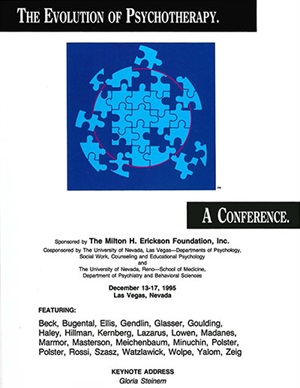
- Average Rating:
- Not yet rated
- Topic Areas:
- Invited Addresses | History of Psychotherapy | Psychotherapy
- Categories:
- Evolution of Psychotherapy | Evolution of Psychotherapy 1995 | Pioneers in Couples and Family Therapy
- Faculty:
- Judd Marmor | Jay Haley, MA
- Duration:
- 1 Hour 28 Minutes
- Format:
- Audio Only
- Original Program Date:
- Dec 14, 1995
- Short Description:
- The author traces the evolution of psychodynamic theory over the past fifty years and demonstrates how various individuals and schools of thought have contributed to increasing conceptual clarity despite significant continuing differences. Along with these theoretical advances, there have been important changes in analytically-oriented therapeutic techniques.
- Price:
- $15.00 - Base Price
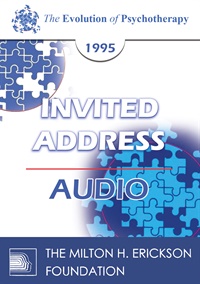
- Average Rating:
- Not yet rated
- Topic Areas:
- Invited Addresses | Cognitive Behavior Therapy (CBT) | Psychotherapy | Anxiety | Depression | Panic
- Categories:
- Evolution of Psychotherapy | Evolution of Psychotherapy 1995 | Pioneers in Couples and Family Therapy
- Faculty:
- Aaron Beck, MD | Salvador Minuchin, MD
- Duration:
- 1 Hour 31 Minutes
- Format:
- Audio Only
- Original Program Date:
- Dec 14, 1995
- Short Description:
- Cognitive therapy was originally developed for the treatment of Depression and Anxiety. Since its early beginnings various clinicians and investigators have extended its use to a wide variety of disorders and populations. Systematic outcome studies have demonstrated its efficacy not only in the garden variety of disorders such as Depression, Anxiety and Panic but also in medical disorders such a low back pain, diabetes, chronic fatigue syndrome and chronic hypertension.
- Price:
- $15.00 - Base Price
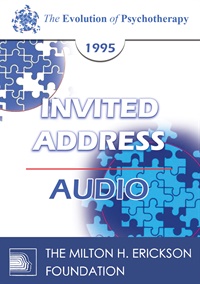
- Average Rating:
- Not yet rated
- Topic Areas:
- Invited Addresses | Psychoanalysis | Anxiety | Psychotherapy | Research
- Categories:
- Evolution of Psychotherapy | Evolution of Psychotherapy 1995
- Faculty:
- Albert Ellis, PhD | Joseph Wolpe, M.D.
- Duration:
- 1:31:10
- Format:
- Audio Only
- Original Program Date:
- Dec 14, 1995
- Short Description:
- In the early decades of the 20th century Freud's mastery of the craft of presenting a case enthroned a belief that anxiety disorders were caused by repressed emotional complexes and that recovery required the restitution of repressed ideas. This belief dominated psychotherapeutic practice, and even though little was to be seen in the way of success, any alternative was treated with scorn. Mid-century studies of experimental neuroses showed that these disturbances were the consequence of the learning of maladaptive anxiety and could be overcome by systematic counteraction by other emotions.
- Price:
- $15.00 - Base Price
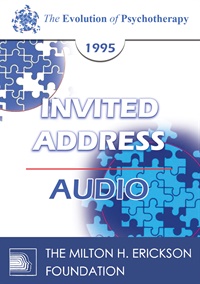
- Average Rating:
- Not yet rated
- Topic Areas:
- Invited Addresses | Rational Emotive Behavior Therapy (REBT) | History of Psychotherapy | Psychotherapy
- Categories:
- Evolution of Psychotherapy | Evolution of Psychotherapy 1995
- Faculty:
- Albert Ellis, PhD | Aaron Beck, MD
- Duration:
- 1 Hour 19 Minutes
- Format:
- Audio Only
- Original Program Date:
- Dec 13, 1995
- Short Description:
- My own physical disabilities as well as my performance anxiety during my childhood and adolescence impelled me to read many ancient and modern philosophers who had worked on the philosophy of human happiness and unhappiness. Thinking about their views and adapting them to my own life, I made myself distinctly less disturbed as well as less disturbable.
- Price:
- $15.00 - Base Price
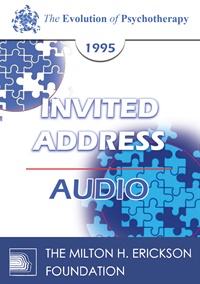
EP95 Invited Address 01b - The Evolution of a Cognitive Behavior Therapist - Donald Meichenbaum, PhD
- Average Rating:
- Not yet rated
- Topic Areas:
- Invited Addresses | Cognitive Behavior Therapy (CBT) | History of Psychotherapy | Psychotherapy
- Categories:
- Evolution of Psychotherapy | Evolution of Psychotherapy 1995
- Faculty:
- Donald Meichenbaum, PhD | William Glasser, MD
- Course Levels:
- Master Degree or Higher in Health-Related Field
- Duration:
- 1:31:51
- Format:
- Audio Only
- Original Program Date:
- Dec 13, 1995
- Short Description:
- The development of cognitive-behavior therapy parallels major developments in how to conceptualize the role of cognition in psychopathology and behavior change. Dr. Meichenbaum will trace his "personal journey" as a clinician and researcher, noting the altering views of cognition from a behavioral, information processing and constructive narrative perspective. He will examine the therapeutic and research implications of this shift.
- Price:
- $15.00 - Base Price
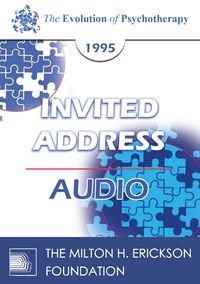
- Average Rating:
- Not yet rated
- Topic Areas:
- Invited Addresses | Bioenergetics | Mind-Body | Psychotherapy
- Categories:
- Evolution of Psychotherapy | Evolution of Psychotherapy 1995
- Faculty:
- Alexander Lowen, MD | Judd Marmor
- Duration:
- 1 Hour 31 Minutes
- Format:
- Audio Only
- Original Program Date:
- Dec 13, 1995
- Short Description:
- The split in the modern personality is between the head and the body, between the rational mind and irrational gut feelings. It reflects the split in this culture between science and the natural forces in life and nature which science attempts to control. The modern individual lives largely in his head and is out of touch with his body because he had deadened it to suppress the fear, the pain and the despair which he experienced in childhood.
- Price:
- $15.00 - Base Price
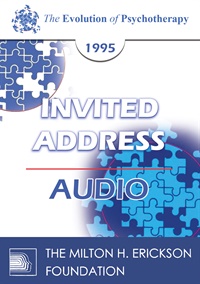
- Average Rating:
- Not yet rated
- Topic Areas:
- Invited Addresses | Psychotherapy
- Categories:
- Evolution of Psychotherapy | Evolution of Psychotherapy 1995 | Pioneers in Couples and Family Therapy
- Faculty:
- Thomas Szasz, MD | Paul Watzlawick, PhD
- Duration:
- 1:24:29
- Format:
- Audio Only
- Original Program Date:
- Dec 13, 1995
- Short Description:
- In the ancient world, the philosopher was a physician of the soul who, employing the healing word (iatroi /ogoi), offered counsel to persons perplexed by problems in living. After the triumph of Christianity, the priest as confessor-counselor replaced the philosopher as rhetorician of consolation. With the birth of psychiatry, and especially since the Freudian revolution, we call helping persons with words "psychotherapy." I shall try to show that without a decisive separation of rhetorical healing from medical healing, psychotherapy as the secular cure of souls is doomed to extinction.
- Price:
- $15.00 - Base Price
Tags: Psychotherapy Thomas Szasz
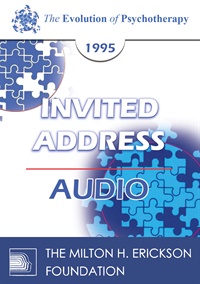
- Average Rating:
- Not yet rated
- Topic Areas:
- Invited Addresses | Family Therapy | Psychotherapy | Relationships | Shame | Strategic Therapy | Children and Adolescent Therapy
- Categories:
- Evolution of Psychotherapy | Evolution of Psychotherapy 1995 | Pioneers in Couples and Family Therapy
- Faculty:
- Cloe Madanes, HDL, LIC | James Bugental, PhD
- Course Levels:
- Master Degree or Higher in Health-Related Field
- Duration:
- 1:27:24
- Format:
- Audio Only
- Original Program Date:
- Dec 13, 1995
- Short Description:
- This discussion examines the role of shame in family systems and society, highlighting its function in moral development and social cohesion. A therapeutic model for juvenile sex offenders, involving public apologies and reparations, reports a 96% success rate in preventing reoffense. The conversation explores how public acknowledgment can repair relationships and address collective trauma, while also distinguishing between shame, guilt, and regret in therapeutic practice.
- Price:
- $15.00 - Base Price
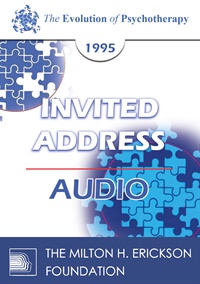
- Average Rating:
- Not yet rated
- Topic Areas:
- Invited Addresses | History of Psychotherapy | Psychotherapy | Brief Therapy | Family Therapy
- Categories:
- Evolution of Psychotherapy | Evolution of Psychotherapy 1995 | Pioneers in Couples and Family Therapy
- Faculty:
- Jay Haley, MA | Mary Goulding, MSW
- Duration:
- 1 Hour 20 Minutes
- Format:
- Audio Only
- Original Program Date:
- Dec 13, 1995
- Short Description:
- This session covers changes in psychotherapy, focusing on shifts driven by funding, client needs, and court involvement. It contrasts directive and non-directive approaches, highlights the rise of brief, problem-focused therapy, and critiques early psychoanalytic views. Emphasis is placed on balancing therapist guidance with patient-centered goals. Moderated by Betty Alice Erickson, MS
- Price:
- $15.00 - Base Price
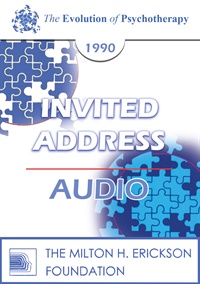
- Average Rating:
- Not yet rated
- Topic Areas:
- Invited Addresses | History of Psychotherapy | Psychotherapy | Therapist Development
- Categories:
- Evolution of Psychotherapy | Evolution of Psychotherapy 1990
- Faculty:
- Rollo May, PhD | James Hillman, PhD
- Duration:
- 1 Hour 6 Minutes
- Format:
- Audio Only
- Original Program Date:
- Dec 16, 1990
- Short Description:
- Epicurus, Kierkegaard, and Nietzsche are forefathers of contemporary psychotherapy. Freud was aware of these wellsprings of modern therapy, and Jung brings them specifically into his writing and his methods. We not only get hints from these forefathers, but we also find a lasting base in them, such as Bubar's "l-thou" construct or Kierkegaard's emphasis on the ultimate relationship of the self to life. These ideas are assumed in Freud, Jung, Adler, Rank, Fromm and other leading therapists in our day. It is these latter therapists who have given us the web of ideas which underlie contemporary psychotherapy.
- Price:
- $15.00 - Base Price
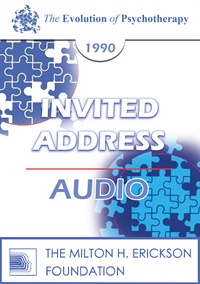
- Average Rating:
- Not yet rated
- Topic Areas:
- Invited Addresses | Psychotherapy | Therapist Development
- Categories:
- Evolution of Psychotherapy | Evolution of Psychotherapy 1990
- Faculty:
- James Bugental, PhD | Erving Polster, PhD
- Duration:
- 1:30:07
- Format:
- Audio Only
- Original Program Date:
- Dec 16, 1990
- Short Description:
- Human experience and human action center in and derive from human subjectivity. Our preoccupation with objectivity results displaces identity from inner living to external. Life-changing psychotherapy requires centered awareness and self-direction. Three therapeutic elements are prime: Full presence, major commitment, and exploring client's self-and-world constructs.
- Price:
- $15.00 - Base Price
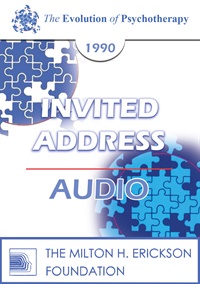
- Average Rating:
- Not yet rated
- Topic Areas:
- Invited Addresses | Borderline | Narcissism | Personality Disorders | Attunement | Therapeutic Relationship | Psychotherapy
- Categories:
- Evolution of Psychotherapy | Evolution of Psychotherapy 1990
- Faculty:
- James F. Masterson, MD | Helen Singer Kaplan, MD, PhD
- Duration:
- 1 Hour 29 Minutes
- Format:
- Audio Only
- Original Program Date:
- Dec 16, 1990
- Short Description:
- The importance of therapeutic alliance is described. Therapeutic alliance, transference, and transference acting-out are defined and distinguished from each other and the therapeutic task of helping the patient to convert transference acting-out to therapeutic alliance and transference is outlined. The differences in the form and content of the intrapsychic structure are described to show why different therapeutic techniques are necessary to establish the therapeutic alliance: Confrontation with the borderline and mirroring interpretation of narcissistic vulnerability with the Narcissistic Personality Disorder. A brief case illustrates each.
- Price:
- $15.00 - Base Price
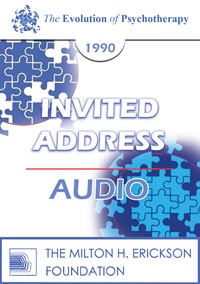
- Average Rating:
- Not yet rated
- Topic Areas:
- Invited Addresses | Psychotherapy | History of Psychotherapy | Transference / Countertransference
- Categories:
- Evolution of Psychotherapy | Evolution of Psychotherapy 1990
- Faculty:
- Judd Marmor | Arnold Lazarus, Ph.D.
- Duration:
- 1 Hour 29 Minutes
- Format:
- Audio Only
- Original Program Date:
- Dec 16, 1990
- Short Description:
- The emphasis in Dynamic Psychotherapy over the past few decades has shifted from a focus on insight and the recovery of early memories to a recognition that the quality of the patient-therapist relationship is the quintessential factor upon which the success of therapy depends. This involves both the real relationship and transference-countertransference elements, all within a systems-theory orientation.
- Price:
- $15.00 - Base Price
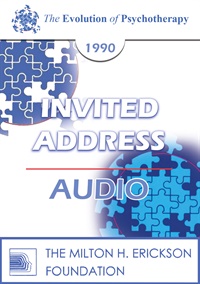
- Average Rating:
- Not yet rated
- Topic Areas:
- Invited Addresses | Reality Therapy | History of Psychotherapy | Psychotherapy
- Categories:
- Evolution of Psychotherapy | Evolution of Psychotherapy 1990
- Faculty:
- William Glasser, MD | Jeffrey Zeig, PhD
- Duration:
- 1 Hour 28 Minutes
- Format:
- Audio Only
- Original Program Date:
- Dec 15, 1990
- Short Description:
- This address includes a brief history of Reality Therapy, and explains that it is based on control theory and that it is applied to both counseling and managing clients. Case examples are used to show that it is composed of two major components: Creating the counseling environment and the procedures that lead to change.
- Price:
- $15.00 - Base Price

